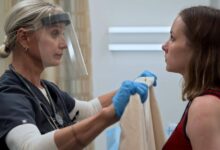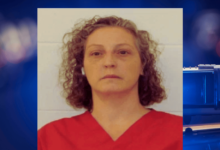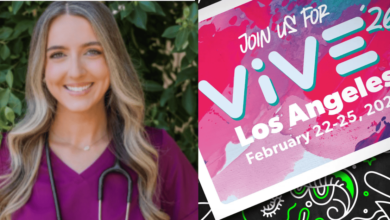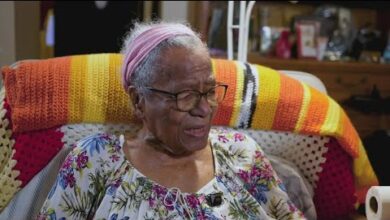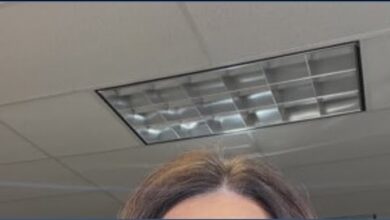How specialist nurse is advocating for undiagnosed children

A nurse who specialises in caring for children with undiagnosed conditions has told of the rewards and challenges of her unique role.
Anna Jewitt is the only Roald Dahl SWAN nurse specialist in England and is based at Great Ormond Street Hospital (GOSH) in London.
“That’s just really rewarding when you know you’ve helped a family by doing that simple thing”
Anna Jewitt
SWAN means ‘symptoms without a name’ and covers people with an undiagnosed condition that has a probable genetic cause. Ms Jewitt currently holds a caseload of 212 children.
She came into the role in 2016 after the need for a SWAN clinical nurse specialist (CNS) was identified by parents during a preceding study by Roald Dahl’s Marvellous Children’s Charity and GOSH.
Ms Jewitt is now one of the more than 200 specialist nurses in the Roald Dahl network across the UK who focus on supporting children with complex and often underserved conditions.
Speaking at a conference last week for these specialist nurses, Ms Jewitt said one of the key parts of her role was care co-ordination, noting how SWAN children may be under the care of 20 different specialist teams.
More from the Roald Dahl Nurses Conference 2023
Meanwhile, around 50% of her role is providing emotional support to the families in her care, she said.
“I feel like probably about 50% of my role is emotional support of the families because they can just feel so lost and isolated and not sure who to turn to, so it becomes quite a big thing,” she told delegates.
She said these families were at risk of falling through the gaps in health and care services and it was her role to help bridge these gaps.
Other common themes in the way parents felt at the time of referral to her were “not feeling heard” and “living with uncertainty”.
“I think a lot of them have a big fight before they even come to Great Ormond Street,” noted Ms Jewitt.
An evaluation of Ms Jewitt’s role at 12 months after its introduction found that uncertainty among SWAN parents improved from a mean baseline score of 105 to a new score of 88.5.
In comparison, the uncertainty score among parents with hospitalised children was 75 and for those dealing with a recent cancer diagnosis it was 60.2.
Ms Jewitt said these results showed “how high” SWAN parents sat in terms of their level uncertainty even with the extra support of a dedicated CNS.
While she was previously the only SWAN CNS in the UK, there is now two in Cardiff, one for children and one for adults.
Ms Jewitt said she was hoping to secure another SWAN nurse at GOSH in the future.
Speaking to Nursing Times, Ms Jewitt explained that she qualified as a children’s nurse in 2000 and her career before the SWAN role was focused on children’s oncology.
She said that this experience informed her approach to her current role as she strived to ensure SWAN families received the same level of care and support as they would in cancer services.
She said: “I think I very much use that as almost like, oncology is my gold standard – this is what children get automatically when you’re diagnosed with cancer, so I strive to get that for the SWAN families.”
Asked about the rewards her role provides, Ms Jewitt said it was sometimes the “small differences” that she could make in a family’s care pathway that had the biggest positive impacts.
She gave examples of being a listening ear to parents on the phone for them to “offload”, or helping to line up appointments better so that families need to spend less time in hospital, or explaining medical information in an accessible way.
“That’s just really rewarding when you know you’ve helped a family by doing that simple thing,” said Ms Jewitt.
“You get to know the families so well over time and sometimes you are sort of going on that journey with them”
Anna Jewitt
In terms of the challenges, Ms Jewitt said the main one was “definitely the fact [patients] are so complex, they are under so many teams, [so] trying to co-ordinate that and trying to get people talking with each other”.
As part of her role, Ms Jewitt sees a psychologist once a month who is able to support her with her own mental health and provide advice for how she can help the SWAN families with theirs.
Having this regular access to a psychologist was something she said she pushed for as she knew how important it was, noting how this kind of support was automatically provided in her cancer roles.
Explaining the emotional impact of her work, Ms Jewitt said: “You get to know the families so well over time and sometimes you are sort of going on that journey with them a little bit.
“[There are] the heart sinkers where you feel like, how can this family take any more difficult news about another problem that their child’s got? Or just struggling with housing or things like that.
“There are some days where I’m just like, ‘oh, this is just horrible, it’s just awful and it’s not fair’; and [the family is] just having to get on with it every day, and sometimes it just does really hit you.”
As well as seeing the psychologist, Ms Jewitt said being able to talk to her manager when needed and taking time outside of work to relax, exercise and meet with friends all helped her to cope emotionally.
As the only SWAN CNS in England, Ms Jewitt sees patients from all over the country and juggles a high caseload.
Going forward, Ms Jewitt said she was “determined” to secure another specialist nurse to support more of the 6,000 SWAN patients who are estimated to be born in the UK every year.
